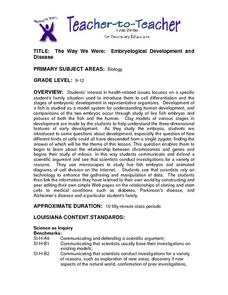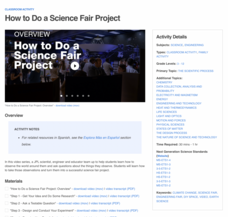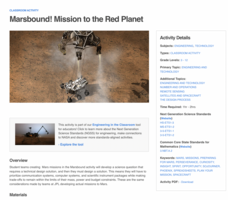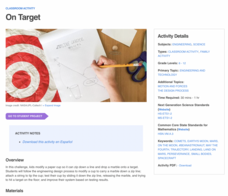Curated OER
Exploring a Teaching Career Through an Energy Lesson
After learning how to dentify information on energy and its conservation. your class can work in groups to create an activity and lesson plan for elementary young scholars, teaching all about energy and its conservation. Students...
Curated OER
The Way We Were: Embryological Development and Disease
Young scholars use microscopes to study live fish embryos and animated diagrams of cell division on the Internet. They see that scientists rely on technology to enhance the gathering and manipulation of data. They create web pages on...
Curated OER
The Science of Lance Armstrong
Live Strong! High schoolers will discuss some of the reasons behind Lance Armstrong's success in cycling and chart those reasons into four categories: Physiology, Psychology, Equipment, Training/Strategy. They will then choose one sport...
Beyond Benign
Evaluating Sustainability and Lifecycle
What makes one product greener than another? Ecology scholars analyze sustainability and lifecycle through a thought-provoking activity. Individuals pick a product, then examine its components to determine its overall impact on the world...
NASA
How Rockets Work
Now, that's some fire power! A five-page handout provides a description of the basics of how rockets work. The reading explains Newton's Laws of Motion by beginning with defining some of the important terms. The article finishes by...
NASA
What Comes Next
Where is NASA going next with their rockets? A reading provides an overview of the next generation of rockets for space exploration. A full-page diagram gives the reader a scaled perspective of what this rocket may look like, for both...
NASA
A Pictorial History of Rockets
3, 2, 1: Blast off! Take a look at the history of rockets through a camera lens. A set of 41 cards displays more than 2,000 years of rockets, from their use as toys to space flight.
NASA
Rocket Races
And they are off! Using Styrofoam meat trays and balloons, individuals build racers that demonstrate Newton's Third Law of Motion. Pupils run their racers three times and make improvements between each trial. To conclude the activity,...
NASA
Water Rocket Construction
What are the basics for building a rocket out of a two-liter bottle? The procedures outline the basics to create an air- and water-powered bottle rocket. Prior to launching the rockets, teams perform safety checks to ensure their designs...
American Institute of Physics
African American Inventors in History
A two-part lesson plan introduces young historians to the work of famous African American inventors. Groups first research and develop a presentation of an inventor that includes biographical information and information about one of...
American Institute of Physics
When Computers Wore Skirts: Katherine Johnson, Christine Darden, and the “West Computers”
Did you know that people, known as computers, performed the complex calculations that are now done by electronic computers? Three of these human computers, Katherine Johnson, Christine Darden, and Melba Roy Mouton are featured in a...
Teach Engineering
Java Programming: Testing the Edges
Tests are no fun, but test cases are extremely helpful. Pupils work in groups to write a Java program that completes a given task. They come up with test cases to give to another group, then trade test cases to determine if their program...
Teach Engineering
Java Code: Does It Work? Test and Test Again
Testing software code can sure test one's patience. Future programmers learn about the importance of testing when writing code for computer software. They access the CodingBat website to test programs written in Java using three test...
Teach Engineering
Balancing Liquid on a Coin: How Intermolecular Forces Work
Let knowledge of chemistry flow like water. Future scientists conduct two different experiments to investigate the properties of water. They learn about surface tension and cohesion as they see how many drops of water they can place on a...
Teach Engineering
Paper Towers and Pool Balls Design Challenge
Those who build together learn together. Scholars work in groups on two teamwork-building activities that involve engineering design. They first construct the tallest tower they can using five sheets of paper and masking tape. Next, they...
Teach Engineering
Viscoelasticity
Stretch one's mind about viscoelastic materials. Future engineers learn about viscoelastic materials and how they differ from solids and fluids. They discover how the molecular structures of the materials relate to their properties,...
NASA
How to Do a Science Fair Project
Build problem-solving skills with science! Step-by-step videos walk investigators through each stage of completing a science fair project. Scientists learn to formulate a testable question, design an experiment, collect data, draw...
NASA
Water Filtration Challenge
Can the class think like the scientists on the International Space Station? Engineers design, test, collect data, and improve a water filtration device similar to a system found on the ISS. Participants use pH strips, optional...
NASA
Feel the Heat
Heat water up like a NASA engineer. Using the engineering design process, investigators create a system to trap and move heat through a water-filled tube. Designers participate in a post-activity discussion that highlights the role of...
NASA
Marsbound! Mission to the Red Planet
Changing one aspect of a mission impacts all the others. Learners consider a list of criteria as they develop their own science questions related to Mars and design a solution while considering all the important systems: computer,...
Bonneville
Bioreactor Water Circulation System
Make those microbes warm up water. Pupils first investigate water pumps, then design a water circulation system that uses solar energy. A bioreactor in the system takes energy from compost and helps heat water.
Bonneville
Compost Bioreactor Design
Organic waste is a hot topic. The second of three installments in the Bioreactor Water Heating unit challenges pupils to create bioreactors that collect energy released from compost. After watching videos on the properties of water and...
Bonneville
Passive Solar Water Heating
Put empty milk jugs to good use. Scholars consider the characteristics they might change about a milk jug to improve light absorption. They design a passive solar water heater using the milk jug and then measure the temperature change in...
NASA
On Target
Crash into engineering by sending a marble to land on a target by way of a zip line. Using a zip line, pupils put engineering design processes into practice by modifying a cup to carry and release a marble onto a target. Scientists test,...

























